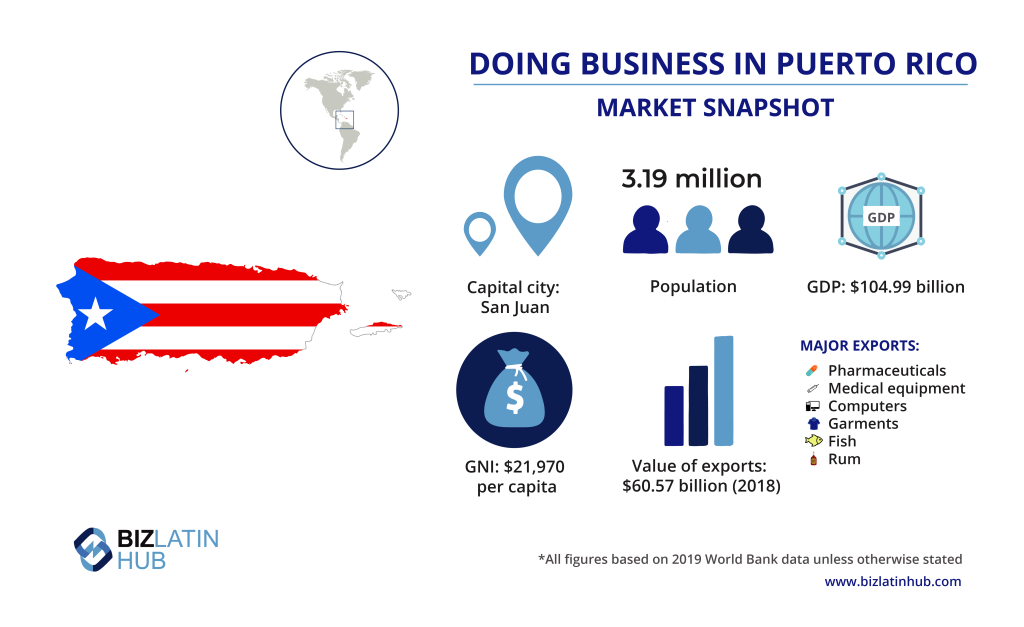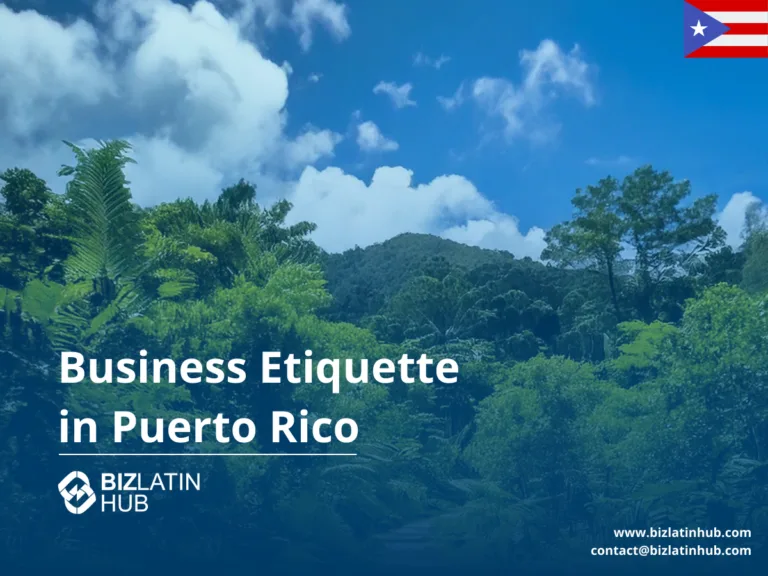In a world of diverse cultures, understanding local business practices can significantly impact success. Puerto Rico boasts a rich cultural tapestry that shapes its business environment. Knowing this can pave the way for successful engagements and lasting partnerships.
Puerto Rican culture emphasizes values such as respect, communication, and relationship-building. These elements guide the business practices on the island. Familiarizing oneself with these cultural nuances is vital for anyone looking to thrive in Puerto Rican markets.
This article explores the essential aspects of Puerto Rican business etiquette. From communication styles to dining customs, each section offers insights to help navigate the nuances of this unique business landscape. Get ready to dive into a comprehensive overview that prepares you for meaningful interactions in Puerto Rico.
The Importance of Proper Business Etiquette in Puerto Rico
Puerto Rican business culture blends Latin American warmth with North American efficiency. Understanding business etiquette is crucial in this environment. Punctuality is key, despite the laid-back “island time” approach. Arrive on time for meetings, although they might begin later.

Building personal relationships holds great importance. Start conversations with friendly chit-chat before diving into business discussions. This practice reflects the value of personal connections in Rican society.
Recognizing local hierarchy is also vital. Show respect to senior positions, often occupied by the upper class. This respect underscores the structured nature of Rican business culture.
Schedule meetings 2 to 3 weeks ahead. Though short-notice meetings happen, timely attendance is seen as professional.
Business Etiquette Tips:
- Arrive on time
- Begin with personal conversation
- Respect hierarchy
- Schedule in advance
Following these guidelines enhances business interactions in Puerto Rico.
Key Aspects of Puerto Rican Culture
Puerto Rico’s culture is a vibrant mix of traditions and influences. Spanish is the official language, with English also widely used, especially in business. This bilingual nature showcases the island’s diverse heritage. Roman Catholicism is the main religion, shaping many aspects of daily life. Besides, there are Protestant, Jewish, and Muslim communities. Religious festivals and beautiful churches highlight Puerto Rico’s spiritual side. The island’s cuisine, known as “cocina criolla,” combines Spanish, African, and Taíno flavors, using fresh ingredients and bold spices. Puerto Rico’s diverse population leads to unique customs and experiences.
Language and Communication Styles
In Puerto Rico, Spanish is the main language, though many professionals speak English well. This makes bilingualism a valuable skill in business. The culture favors indirect communication, where messages might be softened or implied rather than direct. This approach means that building personal relationships is crucial. Direct confrontation can seem disrespectful. Puerto Ricans value active listening and enthusiasm in conversations, reflecting the importance of personal engagement. Language barriers can sometimes complicate interactions with Americans and expatriates, affecting communication and career growth.
The Role of Cultural Diversity
Puerto Rican business culture blends Latin American warmth with North American practices. This mix requires cross-cultural sensitivity from both locals and expats. Using both Spanish and English in professional settings underscores the need for language diversity. In Puerto Rico, personal integrity and creating a family-like environment at work influence management and employee relations. Relationship-building is essential, with small talk before business reflecting personal connection importance. Although island time is relaxed, punctuality is valued, balancing informal traits with professional expectations.
Family Values and Their Influence on Business
Family plays a vital role in Puerto Rican business culture. People prefer doing business with those they know and trust, often involving extended family. The concept of family is important, making colleagues feel like family and necessitating personal relationship cultivation. Trust-building through informal meetings, like long lunches and dinners, is common and vital for establishing credibility. Leadership tends to be paternalistic, with leaders acting protectively, similar to family roles. Personalismo, focusing on personal relationships, is key in decision-making, affecting business processes and outcomes.
Business Communication Etiquette
In Puerto Rico, business etiquette focuses on trust and relationships. Building connections is essential and may delay decision-making. This process requires patience. Communication in Puerto Rican culture is polite and indirect. This approach avoids offending others. Active listening is crucial. Showing enthusiasm in discussions enhances interactions.
Spanish is the primary business language. Using Spanish shows respect and cultural awareness. Some people speak English, but using Spanish is valued. Professionalism in business settings is important. Meetings often start with handshakes and exchanging business cards.
Formal vs. Informal Communication
In professional settings, Puerto Ricans use a formal tone. Titles like Señor and Señora are common. Code-switching is a notable skill. People can shift from formal to informal based on the situation. Traditional formality is prevalent, but younger generations may be less formal. Respect remains central.
Direct yet polite communication is valued. Addressing colleagues with professional titles or surnames is customary. Handshakes are typical greetings in the workplace. Engagement and active listening are key aspects of communication.
Nonverbal Communication Considerations
Non-verbal cues are significant in Puerto Rican business communication. Body language and tone convey much in interactions. Eye contact is important as it shows attention and respect. Open gestures promote a friendly environment. Avoid aggressive body language to maintain positive rapport.
Physical touch, like a pat on the back, is common. It helps build personal connections. Friendly and emphatic expressions highlight the need for emotional engagement in communication. These cues enhance understanding and relationships in Puerto Rican business culture.
Dining Etiquette in Puerto Rico
Dining etiquette in Puerto Rico is informal and welcoming. Meals at home often include uninvited guests. This shows the hospitality present in the culture. It is bad manners to leave the table before the meal ends. This stresses communal dining and respect for the host.
While eating, keep your hands visible and avoid resting elbows on the table. This reflects adherence to certain dining decorum. Leaving a small amount of food on your plate after a meal is acceptable. This indicates contentment and satisfaction with the meal.
In formal settings, when moving to another dining area, let senior members enter first. This shows respect for elders in dining etiquette.
Tipping Practices
Tipping in Puerto Rico generally follows American culture. The standard tip in restaurants is 15% unless a service charge is included. Bartenders typically receive a tip of about $1 per drink. Taxi drivers should get a tip between 10% and 15% of the fare.
In restaurants, it is customary to offer a 10% tip, which is common among locals. Tipping practices are influenced by strong cultural ties and American customs prevalent in Puerto Rican society.
Tipping Quick Guide
| Service | Typical Tip |
|---|---|
| Restaurants | 15% unless service charge included |
| Bartenders | $1 per drink |
| Taxi Drivers | 10% to 15% of the fare |
| Local Dining | 10% |
These practices support both American and Puerto Rican cultural norms, ensuring a smooth experience for visitors and locals alike.
Hierarchical Structures in Puerto Rican Businesses
Hierarchical structures play a key role in Puerto Rican businesses. These companies often follow a tall hierarchy with distinct levels:
- Upper Management: Holds the most power and makes final decisions.
- Middle Management: Brings issues up to upper management.
- Frontline Employees: Follow directives from above.
Authority resides mainly with top executives. This structure leads to a slower decision-making process since approvals must go up the ladder.
Puerto Rican managers often use an autocratic style. They give clear instructions and don’t expect questions. However, they also show care for their team’s personal lives, reflecting a paternalistic approach.
Key Points of Puerto Rican Hierarchical Structures:
- Clear Distinctions: Between management levels.
- Power Distance: Top-down authority.
- Communication Flow: Information moves upward for approvals.
- Leadership Style: Autocratic yet caring.
Understanding these elements is crucial for effective collaboration with Puerto Rican businesses.
Negotiation Styles in Puerto Rico
Negotiation in Puerto Rico centers on forming personal connections. Puerto Rican culture places importance on knowing people personally before engaging in business. This approach makes negotiations longer but more effective.
Relationship Building as a Foundation
In Puerto Rican business culture, trust and rapport are essential. Negotiators spend time in social interaction. They focus on getting to know each other personally. This personal connection fosters a collaborative atmosphere. It encourages open discussion of each party’s needs.
Patience is vital as decisions involve consulting family and colleagues. Puerto Ricans value politeness and respect. Building these personal bonds creates a foundation for successful negotiations.
Direct vs. Indirect Negotiation Approaches
Puerto Ricans often use indirect communication in negotiations. They employ subtle language and gestures to convey messages. This approach minimizes the risk of offending others. It favors a polite and respectful negotiation climate.
Negotiators prefer a collaborative style, avoiding direct confrontations. They prioritize mutual understanding and aim for stability. This indirect method often leads to more harmonious agreements.
Regional Holidays and Their Business Implications
Puerto Rico observes 16 public holidays and grants 15 vacation days, including leave for personal events like birthdays and court appearances. Businesses must consider these days in their schedules.
Three Kings Day (Día de los Reyes Magos) is a key holiday in Puerto Rico. Most businesses and government offices close on this day. Planning around this statutory holiday is essential for smooth operations.
The Christmas celebration in Puerto Rico is lengthy. It starts at Thanksgiving and continues until mid-January. This festive season influences business hours and operations, requiring adjustments to accommodate holiday schedules.
Understanding Puerto Rico’s regional observances is crucial for businesses. It ensures smooth operations and respects local customs. Holiday-related expectations can vary, affecting work-life balance and productivity.
Below is a list summarizing the business implications of holidays in Puerto Rico:
- 16 public holidays impact scheduling.
- Three Kings Day causes business closures.
- Extended Christmas season affects operations from late November to mid-January.
- Work-life balance expectations may shift, impacting productivity during festive periods.
Businesses should plan carefully for these cultural observances to maintain effective operations on the island of enchantment.
Strategies for Successful Business Engagements
Building Trust and Rapport
In Puerto Rican business culture, building relationships is key. Trust, or “confianza,” is vital before addressing specific business details. Negotiators in Puerto Rico dedicate time to social interactions. This helps create a collaborative environment. It allows both parties to express needs openly. Patience is important. Rushing the process may seem rude and aggressive. Informal conversations often occur before formal discussions. Personal connections often outweigh formal documents in importance. As a result, negotiation processes can be lengthy.
Listening and Adaptability
Active listening plays a crucial role in Puerto Rico’s professional settings. Non-verbal cues matter, as they can influence discussions. Puerto Ricans approach change slowly. They prefer thorough planning and evaluation. This helps avoid disruptions. Time is seen with fluidity. Patience is necessary for effective management. Relationship-building is a major part of business conversations. Personal chit-chat occurs before business topics. Code-switching allows adaptation in communication. It’s common among Puerto Ricans and increases their effectiveness.
Respecting Cultural Differences
Understanding Puerto Rican social etiquette is crucial. Respect for customs enhances interactions. Hospitality is important on the island. Visitors should offer a small gift when invited to a home. Accept food and drinks offered to show appreciation. Puerto Ricans greet warmly and friendly. This helps build personal relationships. In public, keep conversations moderate in volume. Maintain cleanliness in communal spaces. This shows respect for local customs.
Building Trust and Rapport
Building trust and rapport is key in Puerto Rican business culture. Relationship-building takes priority over discussing specific business matters. Negotiators in Puerto Rico spend time in social interactions. This creates a collaborative environment where parties can express their needs openly.
Patience plays a vital role when working with Puerto Rican colleagues. Rushing the process might be seen as rude and aggressive. Therefore, taking time is important. Informal leisure conversations are common in negotiations. They are a necessary step before transitioning into business discussions.
Personal relationships often hold more value than formal business documents. This leads to lengthy negotiation processes.
Key Points:
- Prioritize relationship-building before business discussions.
- Engage in social interactions to foster a collaborative atmosphere.
- Emphasize patience and avoid rushing negotiations.
- Recognize the importance of informal conversations.
- Value personal relationships over formal documents.
By focusing on these elements, you can build trust and rapport effectively in Puerto Rican business culture.




